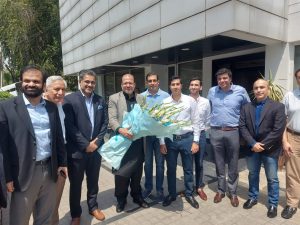LAHORE: Punjab Minister for Industries, Commerce & Investment, Shafay Hussain, has pledged that the provincial government will offer incentives surpassing those of Bangladesh to attract Chinese investors and boost apparel exports through industrial parks in Punjab. Speaking at the All Pakistan Textile Mills Association (APTMA) Lahore office, Minister Hussain emphasised the commitment to creating a stable policy environment.
“A mechanism is being evolved to ensure no change in policy irrespective of the coming in or going out of any government,” he said, adding that full-scale security will be provided for Chinese investors operating in the province.
The minister’s delegation included Mr. Javed Iqbal, Chairman PIEDMC, Mr. Jalal Hassan, CEO of the Punjab Investment Board, and Mr. Asif Ali Farrukh, DG Industries. They received a briefing on the proposed industrial parks in Punjab from APTMA representatives, including Chairman APTMA North Mr. Kamran Arshad, Senior Vice Chairman Mr. Asad Shafi, Vice Chairman Mr. Ahmed Shafi, former Chairman Mr. Abdul Rahim Nasir, Executive Mr. Anjum Zafar, Mr. Muhammad Ali, and Secretary General Mohammad Raza Baqir.

Minister Hussain informed that the Chief Minister of Punjab has recently established a high-powered committee to study global best practices, particularly from Bangladesh, for the development and operation of garment cities based on the ‘Plug and Play Model.’ These industrial parks will feature state-of-the-art infrastructure to attract both foreign and local investors. The committee will provide recommendations on establishing garment parks either within existing industrial estates or on new sites.
The minister expressed confidence that APTMA would provide the necessary technical assistance and expertise to the Punjab government for this initiative. He also assured the resolution of waiving penalties on outstanding social security dues against textile mills in the province.
Chairman APTMA North, Kamran Arshad, elaborated on the vision laid out by APTMA Patron-in-Chief Gohar Ejaz for creating modern industrial zones dedicated to garment manufacturing. The goal is to leverage competitive advantages like low-cost labor and favourable trade status to attract local and international investors, aiming to boost textile exports by an additional $12 billion.
“These industrial parks will offer fully equipped plug-and-play factories for rent, significantly increasing Pakistan’s apparel exports and economic impact, as well as generating substantial employment opportunities to alleviate poverty,” said Arshad.
Senior Vice Chairman Asad Shafi projected that the establishment of these industrial parks could boost export revenue by $2 billion annually in the first phase and up to $12 billion per annum upon completion. This would provide a conducive production environment and enhance competitiveness in the global market.
Former Chairman Abdul Rahim Nasir highlighted the potential benefits of relocating the Chinese apparel sector to Pakistan. He proposed organising roadshows to attract Chinese investment for the industrial parks in Punjab, emphasising that tapping into this $100 billion market could be a game-changer for the province.
The delegation raised several queries about the practical implementation of these plans, which were addressed by the APTMA leadership during the meeting.

